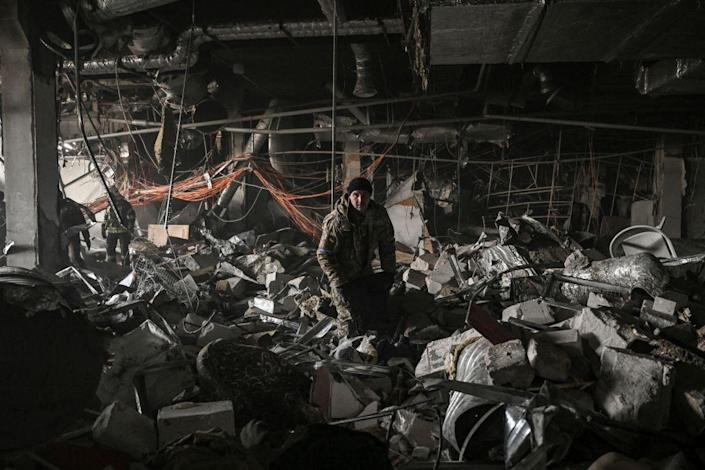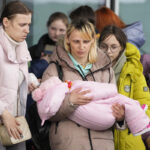Ukraine’s United Nations ambassador shocked many today when he told members of the United Nations Security Council that Russia had abducted 121,000 Ukrainian children from his country since the start of its bloody invasion. The council met to hear of the impact of the Russian war against Ukraine on women and children.
Sergiy Kyslytsya, Permanent Representative of Ukraine told council members that most of the children that he said were abducted by the Russians, were orphans and not those with parents and other relatives. He said the abductions were in flagrant violation of international law and conventions. He also claimed that Russia was reportedly drafting a bill that would “simplify and accelerate the procedures for the adoption of abducted Ukrainian children…”
Kyslytsya said the withdrawal of Russian troops from some areas has left a trail of “unimaginable suffering, with killings, unspeakable torture and sexual violence including rape and mutilation.”
He gave one example that he said was under investigation by Ukraine’s prosecutor’s office of a case where “a Russian soldier killed a local resident and then repeatedly raped his wife in their private house. The suspect’s identity has been established.” He called on the international community to investigate this and other crimes.
UKRAINE’S ZELENSKYY: ‘WE’RE NOT READY TO GIVE AWAY OUR COUNTRY’
He emotionally concluded his speech by reading from a letter from a nine-year-old boy to his dead mother.
“Mama. This letter is my gift to you on the Women’s Day of 8th March… Thank you for the best 9 years of my life! Many thanks for my childhood! You are the best mama in the world. I will never forget you! I wish you good luck in the Heavens. I wish you to get to paradise. I will try to behave well to get to paradise too. Kiss you, your Tolya.”
Linda Thomas-Greenfield the United States ambassador to the United Nations took aim at the Russian president: “When men like President Putin start wars, women and children get displaced. Women and children get hurt. Women and children get raped and abused. And women and children die,” she said.
Thomas-Greenfield spoke of the risks associated for women and children and minority groups during war and described how a deputy mayor from a town in Ukraine recently told reporters “that some girls are cutting their hair short, in hopes of avoiding rape by Russian troops.”
She noted the US is helping to fund projects to protect women and children in and around Ukraine.
The Security Council heard from Kateryna Cherepakha, President of La Strada-Ukraine, a human rights advocacy group for women. She told the council that her group had received reports of rapes committed against women and girls in towns that were occupied by Russian troops. She said Russian troops have used rape as a weapon of war.
She said in one case a victim was raped in front of her family. She also noted that they will never get a full picture of the total number of sexual crimes as many of those who were attacked are dead and won’t be able to report the crime perpetrated against them.
She noted that female prisoners of war have been “exposed to torture including sexual violence (and) undressed in front of male groups harassed and shamed.”
UNICEF’s emergency programs director, Manuel Fontaine, told the council that during his thirty-one years of working in the humanitarian arena that he had, “rarely seen so much damage caused in so little time.”
Fontaine said that of the estimated 3.2 million children said to have remained in their homes nearly half were likely at risk of not having enough food. He also noted that attacks on the water system and power outages have resulted in an estimated 1.4 million people without access to water and with another 4.6 million having limited access to water.
He quoted the United Nations Office for the Coordination of Humanitarian Affairs (OHCHR) on the rising number of dead and injured children: “As of yesterday, OHCHR has verified 142 children killed and 229 children injured. We know these numbers are likely much higher — and many of them were caused by crossfire or the use of explosive weapons in populated areas.”
Russia’s deputy UN ambassador Dmitry Polyanskiy pushed back and accused the council’s western members of continuing to unleash an information war against his country.
He complained that no evidence had been given for all the accusations against his country, and questioned the allegations aimed at Russian soldiers for the massacre of civilians in Bucha, as well as last week’s bombing of a railway station and other places where Polyanskiy claimed fabrications had taken place.
FRANCE ELECTION: EMMANUEL MACRON, MARINE LE PEN PROJECTED TO FACE OFF IN SECOND ROUND
He then claimed that “the staging of the so-called atrocities of the Russian army are being conducted by British film directors.”
The British representative fired back at his Russian colleague for his comments called such claims a lie.
Lord Tariq Ahmad, the British minister for the United Nations told the council that, “Sadly, we’ve once again heard Russia trying to deflect from the facts, the reality on the ground — muddy the waters — by what can only be described as quite extraordinary statements, and even lies. Yet, what is true, what is fact, is that Russian attacks on civilians and residential areas have been truly barbaric.”
The United Nations has so far met a dozen times on Ukraine since the eve of the Russian invasion and has failed to take any significant action to stop Russia’s aggression. Russia as a permanent member of the Security Council holds a veto and was forced to use it in February when the council demanded that Russia stop its invasion and withdraw its troops immediately.




